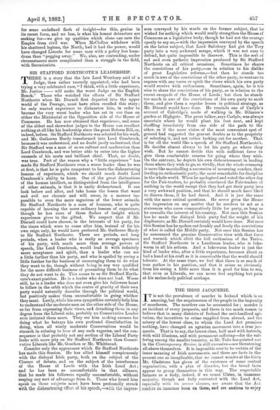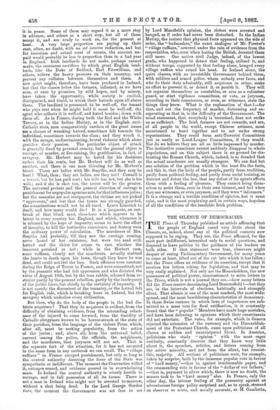THE IRISH JACQUERIE.
JT is not the prevalence of murder in Ireland which is so amazing, but the acquiescence of the people in the impunity of murderers. The murders can be accounted for ; murder is an incident of every jacquerie, and there is too much reason to believe that in many districts of Ireland the anti-landlord agi- tation, the incentives to crime supplied from abroad, and the misery of the lowest class, to whom the Land Act promises nothing, have changed an agrarian movement into a true jac- querie. That is to say, the lowest class, half mad with hatreds, with wild illusions, and with permanent suffering—for the suf- fering among the smaller tenantry, as Mr. Tuke has pointed out in the Contemporary Review, is still excessive—are threatening all above themselves. It is impossible ever to be certain of the inner meaning of Irish movements, and there are facts in the present one so inexplicable, that we cannot wonder at the hints Mr. Gladstone has given of the existence of some central organisation, with a plan of disorder, but the broad facts appear to group themselves in this way. The respectable farmers as a body, indeed, if we count Ulster, in immense majority, tbough not fully contented with the Land Act, especially with its arrear clauses, are aware that the Act confers an immense boon on them, and are anxious to enjoy
it in peace. Some of them may regard it as a mere step in advance, and others as a short step, but all of them accept it, and are ready to work on, for the present at
least. A very large proportion are paying up their rent, often, no doubt, with an ad interim reduction, and but for terrorism and actual want of means, the amount un- paid would probably be less in proportion than in a bad year in England. Irish landlords do not make, perhaps cannot make, the enormous sacrifices by which great English land- lords, like the Duke of Bedford, Earl Fitzwilliam, and others, relieve the heavy pressure on their tenantry, and prevent any collision between themselves and them. A new quiet might, therefore, have been produced in Ireland, but that the classes below the farmers, inflamed, as we have seen, at once by promises, by wild hopes, and by misery, have taken the opportunity, while society is excited, disorganised, and timid, to wreak their hatreds upon all above them. The landlord is presumed to be well-off, the tenant who pays rent when he might hold it must be well-off, the agent who collects it is well-off, and hated besides ; down with them all. As in France, during both the Red and the White Terrors, as in the Indian Mutiny, as in the English anti- Catholic riots, men comparatively careless of the great issues see a chance of wreaking hatred, sometimes felt towards the individual, sometimes towards the class ; and they wreak it, with the savage, undiscriminating, brutal violence which alone
gratifies their passion. The particular object of attack is generally fixed by personal enmity, but the general object is outrage, or murder, or fire-raising, the gratification, in fact, of savagery. Mr. Herbert may be hated for his decisions rather than his rents, but Mr. Herbert will do as well as another, and there is one man thirsting for Mr. Herbert's blood. There are ladies with Mr. Smythe, and they may be hurt ? What, then; they are ladies, are they not? Connell is a tenant, but he has paid rent ; his wife has not, but she is his wife ; and if she is shot too, the terror will be the greater. The universal pretext and the general direction of outrage is punishment for unpopular agrarian acts, for that influences juries; but the assassins are not rentpayers, the victims are not picked "oppressors," and but that the towns are strongly guarded, the assassinations would not be all rural. Leave Limerick to itself, and how many would die ? It is a jacquerie, an out- break of that blind, mad, class-hate which appears to be latent in every country but England, and which, whenever it is released by the hope of impunity, seems to have the effect of insanity, to kill the instinctive conscience, and destroy even the ordinary power of calculation. The murderers of Mrs. Smythe had probably, till they saw the carriage coming, never heard of her existence, but were too mad with hatred and the thirst for crime to care whether the innocent perished or not ; while in the Herbert case, some ruffians, clearly not the murderers, actually stabbed the lambs to death upon his lawn, though they knew he was dead, and could not feel the loss. Such offences were constant during the Reign of Terror in France, and were committed, not by the peasants who had felt oppression and who dictated the votes of August 10th, but by the true rabble, released from re- straint partly by the peasant rebellion, partly by the inadequacy of the public force, but chiefly by the certainty of impunity. It is not merely the discontent of the tenantry, or the hatred felt for English rule, which is breaking loose in Ireland, but the savagery which underlies every civilisation.
But then, why do the body of the people in the bad dis- tricts acquiesce ? That they do acquiesce is evident, from the difficulty of obtaining evidence, from the astounding reluct- ance of the injured to come forward, from the timidity of Catholic clergymen known to be horror-struck at the state of their parishes, from the language of the violent Press, which, after all, must be seeking popularity, from the action of the juries ; and, above all, from the universal belief, current among the police, the officials, the neighbours, and the murderers, that jurymen will not act. That is the separate fact of the situation, for it has not occurred in the same form in any outbreak we can recall. The "village ruffians" in France escaped punishment, but only so long as the central authority directing the force of the State was sympathetic or indifferent. The moment the Convention willed it, outrages ceased, and evidence poured in in overwhelming mass. In Ireland the central authority is utterly hostile to outrage, and in full possession of all its forces. There is not a man in Ireland who might not be arrested to-morrow, without a shot being fired. In the Lord George Gordon riots, the moment the Government was set free to act
by Lord Mansfield's opinion, the rioters were arrested and hanged, as if order had never been disturbed. In the Indian Mutiny, the instant that physical force appeared on the side of order, the " budmashes," the exact analogue of Mr. Forster's "village ruffians," cowered under the rain of evidence from the respectables, who, even when hating the British, detested them still more. One native civil Judge, indeed, of the lowest grade, who happened to detect that feeling, utilised it, and without troops, supported by that feeling alone, hanged every village ruffian who raised his head. In Ireland alone, the quiet classes, with an irresistible Government behind them, with soldiers and armed police, whom nobody ever faces, and who do their duty admirably, still acquiesce in crime, make no effort to prevent it, or detect it, or punish it. They will not organise themselves as constables, or arm as a volunteer guard, or start vigilance committees, or vote, as jurymen, according to their consciences, or even, as witnesses, state the things they know. What is the explanation of that ?—for that, and not the frequency of murder, distressing and ex- asperating as that is, is the difficulty of the Government. The usual statement, that everybody is terrorised, does not strike us as sufficient. The Irish farmers are not cowards, and are, of all people in the world, except Chinese artisans, most accustomed to band together and to act under strong organisations. They could form anti-Terrorist Committees just as easily as Land-League Committees, if they would. Nor do we believe they are all so little impressed by murder. The instinctive conscience cannot suddenly disappear in whole populations, and on this subject there is no ground for dis- trusting the Roman Church, which, indeed, is so dreaded that the actual murderers are usually strangers. We can find but one solution of the problem which in the least fits the facts, and this is, that the body of the people,, partly from tradition, partly from political feeling, and partly from social training, so distrust and detest the law, that any defeat of its agents affects them with a feeling of pleasure. They cannot bring them- selves to assist them, even in their own interest, and feel when they are witnesses, or even jurymen, as if they were "informers." It is a strange and a terrible condition of opinion, but it must exist, and is the most perplexing and, in certain ways, hopeless of all the conditions of the insoluble Irish problem.



































 Previous page
Previous page